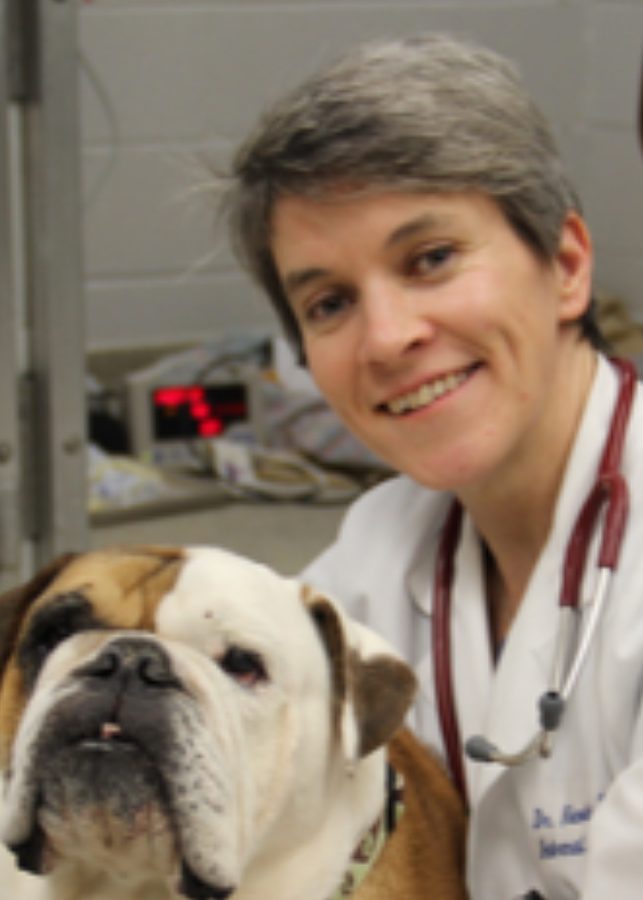Women in Science and Future Entrepreneurs with Girls Who Start meet with Dr. Nicola Mason, founder of animal health company Vetigenics
Dr. Nicola Mason is a founder of Vetigenics and a Professor of Medicine at the University of Pennsylvania’s School of Veterinary Medicine.
Cherry Hill East’s Women in Science and Future Entrepreneurs with Girls Who Start clubs held a virtual guest speaker event with Dr. Nicola Mason on December 6, 2021. Mason, who is a founder of the animal health pharmaceutical company Vetigenics, discussed her experiences in both the medical and business fields and gave students advice about pursuing their own careers in the future.
Founded in 2018, Vetigenics focuses on developing products and treatments to use antibody therapies to treat cancer, infectious diseases, and other chronic conditions in animals. Vetigenics currently specializes in treating dogs, but is working on expanding to cats and possibly horses in the future. Most recently, the company was awarded a two million dollar grant to take their research further and won “Start-Up Company of the Year” from the Penn Center of Innovation.
When asked about advice for success in the business world, Mason told students that after coming up with an idea for a product or service, it is crucial to make sure that this product or service meets a need in the community and to be able to pivot your goals and ideas if needed.
Mason herself was inspired to start Vetigenics after noticing that there was a need for more affordable pet treatments: she was concerned with the amount of people who couldn’t afford treatments for their pets and felt that many pet companies seemed too focused on making money, rather than helping animals.
“I don’t want to make a product that’s only going to be used by the top 1% of people that earn enough money to be able to treat their dogs. That’s not the point,” said Mason.
Today, she says one of Vetigenics’s current focuses is to lower the cost of their antibody treatments, such as by exploring ways to grow the antibodies in plants (rather than in a lab) or to have patients make their own antibodies (similar to how the Covid-19 vaccine’s RNA tell a person’s body how to make Covid-19 antibodies).
While balancing her role at Vetigenics, Mason is also a professor of Medicine and Pathobiology at the University of Pennsylvania. When asked about how she balances her responsibilities both at Vetigenics and at UPenn, Mason said that finding a work-life balance can definitely be challenging, so it’s important to be able to recognize your own limitations and focus on doing what you love.
“I think that as long as you’re doing something that you really enjoy,” said Mason about pursuing a career, “it all becomes less work and more [like] excitement all of the time.” For Mason, one of the most exciting things about her work is seeing her patients — dogs with serious conditions, ones that are often expected to significantly worsen their health — return day after day, wagging their tails happily.
As Vetigenics is a primarily female run company, Mason discussed how she does feel that there is still a gap between how men and women are treated in the business world.
“But I do think there’s still a bit of prejudice there,” said Mason, “[since] we [as women] have to, unfortunately, work a little bit harder to get to that same stage, to be considered a strong leader.” She mentioned that oftentimes women in a position of power can be considered pushy or “not a nice person”, while men in a position of power seem to automatically be considered “strong leaders”.
Mason also shared that Vetigenics (then called “Vetagenics”) had faced a major setback back in 2011, when her application for a research grant for the company had been rejected. The company had almost been stopped right then and there, Mason said, until 2018, when another opportunity for a grant came up. This time, Mason’s application was a success and thus, Vetigenics was born.
“You need to keep going, keep going, you need to push, and when you get knocked down, you need to stand up again,” Mason said about the experience. She encouraged students to never give up, even if they “hit a brick wall.”
Remi Graff (‘22), a president of the Women in Science club, said she felt inspired by how Mason shared her early struggles to start Vetigenics.
“Dr. Mason easily could’ve lied and said she never encountered a struggle,” said Graff, “but her honesty was so rewarding when she talked with pride about her successes.”
“Instead of scaring everyone [and saying that] success isn’t possible, she reassured us, saying that failures are okay as long as you learn from them,” Graff continued.
Graff said that the event helped her see just how connected science and business can be, and based on the feedback from the audience members, “[she] was not the only one realizing that vastly different fields can be combined.”
“I have always been interested in both the sciences and entrepreneurship, but was never quite sure how to combine the two into a career,” said Julia Chan (‘23), vice president of Women in Science and co-founder of Future Entrepreneurs with Girls Who Start, “[but] seeing what Dr. Mason has accomplished by following her passions has inspired me to want to do the same when I am older.”


